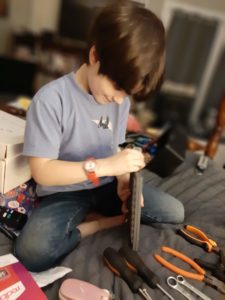 by Jessica Frierson, April 2022
by Jessica Frierson, April 2022
Does the very thought of testing make your heart race and your stomach sick? How do you overcome testing anxiety when the time comes to meet our state requirement for standardized assessment?
NOT the Same as EOGs
It is important to understand the difference between the testing requirements that homeschoolers have and the end-of-grade testing that public schools do. According to DPI, “the North Carolina End-of-Grade Tests” for public school students “are designed to measure student performance on the goals, objectives, and grade-level competencies specified in the North Carolina Standard Course of Study.” The results affect both teachers and students. The standardized testing requirement for homeschooled students is entirely different.
The administrator of the homeschool is responsible for administering a nationally standardized achievement test–not an EOG–within the first twelve months of opening the homeschool and once annually thereafter. Who sees these results? What is done with them? NCDNPE mandates that the “records of the test results…be retained at the home school for at least one year and made available to DNPE when requested.” In the case that DNPE would request to view the test results, that is simply all they would do: glance at them to confirm that testing was done. The results themselves are irrelevant to DNPE.
Purpose for Testing
What, then, is our purpose for testing our homeschooled children? The primary purpose for many families is simply to adhere to our state law. This is often difficult for those leaving the public school system to grasp. The pressure on their child throughout the school year to be prepared for the end-of-grade testing culminates in an intense week of nail-biting tension. Did they perform well enough for promotion to the next grade?
As homeschoolers, our school structure is not based on the results of one week of testing. We, the parent-teachers, design an educational program uniquely shaped to our child’s needs. As one concept is attained, we move them on to the next one. We can move on to the next level of one subject while continuing to work on another one that they may be having more difficulty with. Promotion can be done separately between subjects rather than by the grade in general and is done entirely on a timetable that is customized for that child.
Results Are a Tool
 The most important thing to remember about the test results are that they are simply a tool for us to use to gauge what areas need to be strengthened. There is no pass or fail. With most tests, the results will only show a comparison of how the child performed compared to other children who took the test during the year that the test was normed.
The most important thing to remember about the test results are that they are simply a tool for us to use to gauge what areas need to be strengthened. There is no pass or fail. With most tests, the results will only show a comparison of how the child performed compared to other children who took the test during the year that the test was normed.
Some types of tests offer reports that are more precise in revealing specific areas for improvement. The Woodcock Johnson, for example, can be done with additional subtests that can give more detailed information on specific areas that you may be concerned about. Some achievement tests can be paired with a cognitive test to help determine learning difficulties, such as dyslexia.
Whichever test you decide to use for your child, the results are for your use alone. They are a tool in your large box of resources available to enhance your child’s educational experience. They neither define your child nor restrict his or her promotion. So you can both take a deep breath, relax, and approach test day with a fresh perspective.
Make It a Fun Day
 Instead of testing day being a thing to dread, make it a special day that your family can actually enjoy. You could start out with a nice breakfast. Incorporate several breaks in the testing schedule. Be sure that your child gets up and moves around or goes outside for some fresh air during their break. Have some snacks available. If the weather is nice, our family often plans a picnic lunch for testing day. If it ends up rainy, we have an afternoon tea time instead. End the day with a family movie time or play a board game.
Instead of testing day being a thing to dread, make it a special day that your family can actually enjoy. You could start out with a nice breakfast. Incorporate several breaks in the testing schedule. Be sure that your child gets up and moves around or goes outside for some fresh air during their break. Have some snacks available. If the weather is nice, our family often plans a picnic lunch for testing day. If it ends up rainy, we have an afternoon tea time instead. End the day with a family movie time or play a board game.
If your child is showing signs of fatigue or anxiety, call off testing for the day and give them a fresh start tomorrow. One way my children have turned testing into a fun event is by looking at it as something of a game in itself. I have even had them ask me if they could do it again when the test had been completed! They have guessed ahead of time which area they think they will do best in and have often surprised themselves with the outcome. However, I never permit them to compare themselves to each other.
Limit Testing’s Impact
Our children need to share the mindset that testing can have a useful purpose but is never a weapon to use against ourselves or others. It does nothing to gauge who we are as a person or to indicate that someone is better or less than another. This means that I don’t show them the percentile rankings on the test scores.
In fact, the only element of the test results that I ever share with my children is occasionally telling them, “we will work on multiplication facts next week,” if their test results indicated a weakness there. More often I will tell them, “you’ve really improved in your math skills,” or “you are really learning to spell well this year!” For the most part, we schedule a day for doing the achievement tests, make a fun day of it, then move on. After printing their results, I file them in my school folder and that’s the end of testing’s impact on our lives until the next year.
Stress-free testing is one of the many benefits of homeschooling. Test day can actually be a pleasant experience for both you and your child. Test results that are viewed in the appropriate light are a useful resource. For additional information on testing, visit NCHE’s Helps page, check out this article on selecting the best test for your child, or watch our free testing webinar.
Jessica Frierson is a homeschool graduate and has been homeschooling her ten children since 2000. She serves as the secretary for NCHE, writes for GREENHOUSE, and is the lead blogger for the NCHE Blog.
The post Stress-Free Testing appeared first on North Carolinians for Home Education.
